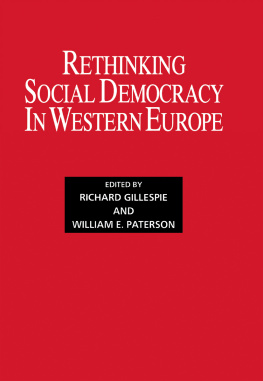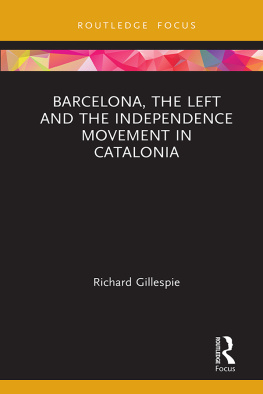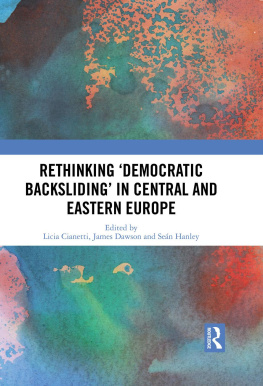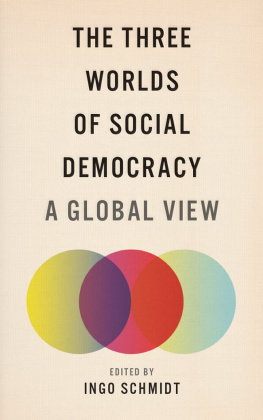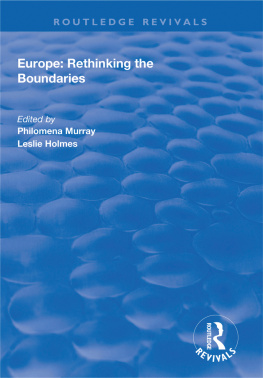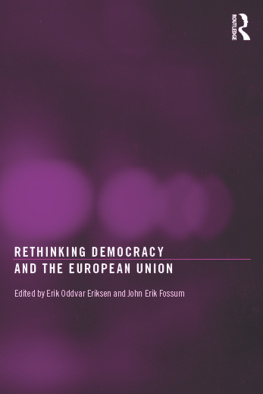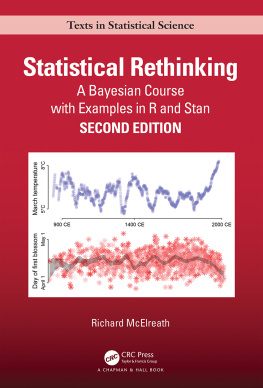First published 1993 by
FRANK CASS & CO. LTD
Published 2013 by Routledge
2 Park Square, Milton Park, Abingdon, Oxon OX14 4RN
711 Third Avenue, New York, NY, 10017, USA
Routledge is an imprint of the Taylor & Francis Group, an informa business
Copyright 1993 Frank Cass & Co. Ltd.
British Library Cataloguing in Publication Data
Rethinking Social Democracy in Western
Europe. (West European Politics Series, ISSN 0140-2382; Vol. 16, No. 1)
I. Gillespie, Richard
II. Paterson, William E. III. Series 320.5
Library of Congress Cataloging-in-Publication Data
Rethinking social democracy in Western Europe / edited by Richard Gillespie and William E. Paterson
p. cm.
Includes bibliographical reference and index.
1. Socialist parties Europe. 2. Socialism Europe. 3. Europe Politics and government 19451989. I. Gillespie. Richard, 1952. II. Paterson, William E.
JN94.A979R48 1993
320.5315094-dc20
93-6515
CIP
ISBN 13: 978-0-714-64525-4 (hbk)
ISBN 13: 978-0-714-64098-3 (pbk)
This group of studies first appeared in a Special Issue on Rethinking Social Democracy in Western Europe of West European Politics, Vol. 16, No. 1 (January 1993), published by Frank Cass & Co. Ltd.
All rights reserved. No part of this publication may be reproduced in any form or by any means, electronic, mechanical, photocopying, recording or otherwise, without the prior permission of the publisher.
Typeset by Florencetype, Kewstoke, Avon
WILLIAM E. PATERSON
Socialism is what a Labour Government does.
This view of socialism, often attributed to Herbert Morrison,1 was regarded as a curious British joke by democratic socialists on the European mainland. There, programmes and programmatic activity have been at the centre of party life and activity since the foundation of socialist parties in the last quarter of the nineteenth century.
THE ERFURT MODEL
The status, character and role of programmes in these parties was set by the Erfurt Programme (1891) of the German Social Democratic Party(SPD). The Erfurt Programme provided both a long-term Marxist analysis of society and a series of short term political demands to be realised within the capitalist system and was seen to fulfil several crucial functions. Externally, it provided the basis of electoral appeal. For the party members the programme served to mobilise, to integrate and act as a blueprint for action should governmental status be attained. Its electoral function has meant that programmes have been subject to continual revision, a revision which has affected not only the short-term goals but also the analysis intended to underpin them.
The Erfurt Programme was challenged within a decade of its adoption by Eduard Bernstein (18501932) who not only wanted to change its short-term political goals but disagreed fundamentally with the analysis of capitalism embedded in the Programme. Bernstein was concerned to point to the unlikelihood of constructing an electoral majority on the basis of the proletariat and the need for the party to secure allies. This necessitated changing the partys view of capitalist development since the Erfurt Programme incorporated Marxs immiseration thesis in which the old middle class would shrink and its displaced members would then join the ranks of the proletariat and the unemployed. This challenge set off prolonged factional struggles inside the SPD between, on the one hand, those who wanted radical political goals to complement the radical analysis, and on the other hand the revisionists, like Bernstein, who wanted to bring the analysis into line with the rather moderate goals pursued by the party. The party leadership, for symbolic and integrative reasons, preferred to stick to the Erfurt recipe of radical analysis and moderate practice since even an electoral majority would not have brought them into government in Imperial Germany.
The programmatic orientation that characterised the continental social democrats was never really adopted by the British Labour Party. Identity in the Labour Party was defined organisationally rather than theoretically. The key test was not whether a member accepted some specific statement of socialism but the absence of membership in some other political organisation. In that sense it bore a striking resemblance to the Anglican Church which has never emphasised doctrinal purity. Theoretical questions were transformed into organisational questions and the characteristic leadership response to a challenge was not to engage in a theoretical debate but to expel the dissidents, a response still very marked in the Militant episodes of the 1980s.
BAD GODESBERG AND PROGRAMMATIC REFORM
The central position of the SPD in the adoption of party programmes was retained in the widespread revision of party programmes that occurred at the end of the 1950s. The sustained economic boom of that decade and dissatisfaction with the residual Marxist legacy were common factors throughout a Western Europe that was closely linked to the United States. Pressure for programmatic change was particularly strong in Germany given the negative associations of many traditional aspects of socialism as a result of the establishment of the deeply unpopular German Democratic Republic (GDR). Three successive electoral defeats underlined these handicaps and programmatic changes offered a route to power by making the SPD an acceptable coalition partner for one of the bourgeois parties a failure to engage in programmatic reform would have confronted the SPD with the prospect of permanent opposition. The resulting Bad Godesberg Programme of 1959 disavowed the Marxist heritage of the SPD and embraced liberal pluralism and the market economy.
One of the most interesting features of the Bad Godesberg Programme was the manner in which it acted against Prezeworski and Spragues view that social democratic parties were bound to lose in the trade-off between securing more middle class allies by moderating their appeal and losing working-class support. The banning of the West German Communist Party and the association of socialism with the GDR meant that the SPD could increase its support among the middle class without losing working-class support. The weakness of communist parties meant that it was also a relatively cost free undertaking for other parties in the traditional social democratic heartlands of Scandinavia and Austria.
The example of the SPD was widely copied among other West European parties. The major exception was the British Labour Party where Hugh Gaitskells attempt to outflank Clause 4 and its commitment to public ownership (incidentally, a part of the partys constitution rather than an element of its programme) by a wider statement of aims was defeated by a coalition of powerful trade unionists. Despite this defeat, most of the revisionist positions were adopted in practice in the 1960s and 1970s.


